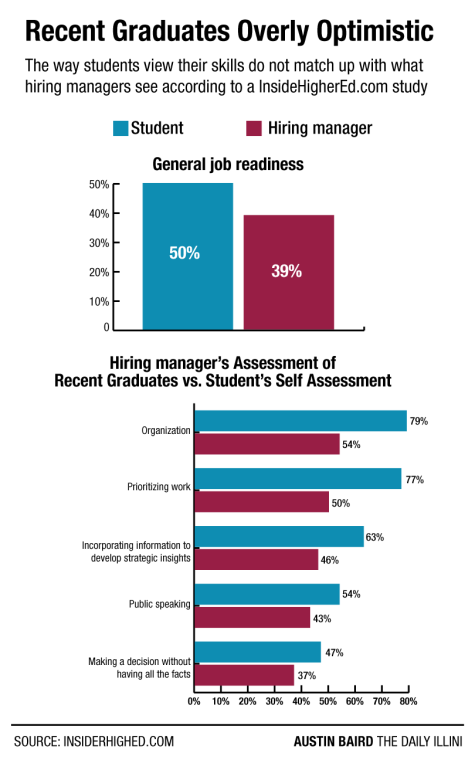Recent study shows graduates overestimate their skill-mastery
May 8, 2014
The worry that consumes most students’ lives during their senior year is whether they are going to get a job.
Once the job has been locked down and students have a diploma in hand, they must shift their focus to making the transition between the school world and work world.
A new study released by Chegg, a company which offers academic services, found that students overestimate their proficiency in regards to basic professional skills such as prioritizing work, managing a meeting and communicating with an authority figure.
“It’s a huge transition in one’s life to go from school into a job. The expectations are completely different,” said Jennifer Neef, associate director of career and professional connections at The Career Center. “The job of a student … for the previous 15 or so years has been ‘how to be a student’ — and they know how to be a student really well; however, most students have not had a full-time, permanent position.”
Because most students do not have actual work experience, it takes them some time to figure out how to be an effective professional, Neef said.
Get The Daily Illini in your inbox!
Just as each school has its own culture, companies have their own environments and ways of doing things.
“I think the interview is … a critical time to ask questions about company culture, to observe company culture … and really think about ‘do I see myself working in this space within this organization?’” Neef said.
She suggested job applicants ask what the interviewer likes about their job and working for that particular company.
In addition to getting information from an interview, job applicants can use LinkedIn to reach out to other employees from the company or University alumni to find out more about what the job is really like.
Brian Mortell, a 2013 University graduate who now works in marketing, agreed that one of his main concerns about starting his first job after graduation was whether he was going to like what he did and whether the job would match his expectations.
“You can only really gain so much from interviewing or doing research or even talking to people that work there,” he said. “People are going to upsell things when you’re interviewing because not only are they interviewing you, but you’re kind of interviewing them.”
Still, he said, it’s important to go into the job with an open mind and flexible attitude.
Mortell also said the transition from the school world to the work world highlights differences between the life and schedule of a student and of an employee. In the work world, employees are not given a syllabus and the expectations for assignments can be more nebulous.
“The world of work is not school, and school is not the world of work,” Neef said. “You pretty much know what it’s going to take to get an A in a class. Sometimes (in the world of work) it’s less transparent what it takes to be successful or what exactly you’re being measured against.”
Neef said it’s critical for new hires to establish open and transparent communication with their supervisor. Together, they can sort through exactly what is expected of the new employee and how they will be evaluated.
As he wraps up almost a year of being in the workforce, Mortell said he has learned how schoolwork differs from actual work in terms of impact.
“At work, you are accountable for your work, but that contributes to a much bigger picture,” he said in an email. “The work you do in school impacts your grade. The work you do at your job can impact your reputation and the company.”
Melanie Cohen, a senior in Business, said making a good impression is one of her primary concerns about entering the workforce.
“I know that I’m prepared to do what I need to do,” she said. “Forming (those) first relationships … and establishing myself as a professional is the next step.”
One important relationship Neef and Mortell both suggest establishing is to find a more senior employee who can act as a mentor.
Neef recommends that new hires find someone who has been in the organization for two or three years who is not their direct supervisor. New employees can then ask their mentor any questions that they feel too awkward or uncomfortable asking the boss.
Cohen said she’s learned a lot through talking to peers who have recently graduated. She also attended a program through the College of Business that allowed her to ask alumni anything about how to navigate her first job.
“That was nice because it was a more casual setting and I could get real answers,” she said.
Ultimately, though, Cohen feels that learning how to navigate and adjust is something that must be learned on the job.
“As much as I can be prepared — or just try to be prepared — by school and by talking to other people, I know it’s something I’ll just have to figure out on my own,” Cohen said.
Steffie can be reached at [email protected].







